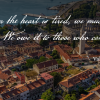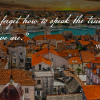
Published: January 31, 1999
View the Original Newsletter: Iskra-27.pdf
About This Issue
Iskra No. 27 is one of the most moving and personal issues written by Valentina Krčmar. Her editorial — a heartfelt letter to readers — reflects on her visit to Vukovar during its darkest days under Serbian occupation and calls upon the Croatian community in Canada to fulfill their promise to help rebuild the city. The issue also includes updates from Croatia, community news from Toronto, and cultural features, capturing a moment when faith, responsibility, and memory intertwined.
Motrišta: “Vukovar in Our Hearts”
In her emotional essay, Valentina recounts a visit to Vukovar about a year and a half earlier, when the region was still under Serbian control and operating under the supervision of the OSCE. She carried medicine to the Vukovar hospital, donated by a Canadian woman who wished to help Croatian civilians.
Upon arrival, Valentina describes walking into a hospital filled with Serbian staff, Cyrillic signs, and the isolation of Dr. Vesna Bosanac, the lone Croatian doctor who had stayed behind. Despite the fear and tension, Dr. Bosanac recognized Valentina and embraced her, saying, “Look, it’s our Bedem Ljubavi!” — recalling their shared activism in the Mothers for Peace (Bedem Ljubavi) movement.
That moment of recognition transcended politics and fear; it symbolized endurance, compassion, and the lasting bond between Croatians everywhere.
Valentina explains that the story comes to mind because of an upcoming fundraising dinner for the reconstruction of Vukovar, to be held on February 13, 1999, at the Croatia Banquet Hall in Mississauga. She urges the community to donate generously, reminding them that rebuilding Vukovar is not just about bricks and mortar but about keeping promises made during the war.
She rebukes the cynicism of those who refuse to give, saying things like “Why rebuild for the Serbs who live there now?” Her response is sharp and heartfelt: to neglect Vukovar now is to betray the memory of Siniša Glavašević, Blago Zadro, and all who gave their lives for the city.
“Our sacred duty is to rebuild Vukovar. We once swore that we would. We must not let our promises fade into silence.”
She closes with the words of Siniša Glavašević from his final broadcast:
“You can build again — your past, your present, and your future. The city has always been with you, hidden, so the enemy could not find it. The city — that is you.”
Her essay is both an elegy and a call to conscience, reaffirming the emotional and moral unity of Croatians at home and abroad.
From the Editor’s Desk
Valentina begins this month’s editor’s letter with characteristic honesty and warmth. She thanks readers for their feedback and explains that producing Iskra remains a labor of love — one that depends entirely on personal effort and community support.
She shares her hope to one day publish Iskra in color, “to show you the beauty of Croatia as it truly deserves.” For now, every issue continues through the combined determination and limited means of the editorial team.
She also comments on an incident where Motrišta was criticized on a Croatian radio show, defending the publication’s integrity and inviting open dialogue. “I sign every word I write,” she says, “and I stand by each one.”
Valentina closes her letter with a reflection on Valentine’s Day — not as a commercial event, but as a celebration of love and understanding. “The greatest gift,” she writes, “is to have someone beside you who understands and loves you.”
News from Croatia
Prepared by Slavko Butković, this section covers significant political and social developments in January 1999:
-
President Franjo Tuđman emphasizes Croatia’s independence in the face of international pressures.
-
The Croatian opposition calls for constitutional reform to reduce presidential powers, sparking national debate.
-
Zvonimir Čičak, human rights activist, receives the Prosvjeta Cultural Award for his contribution to civic dialogue.
-
The Croatian Tiskara (printing company) faces a financial crisis, leading to contract terminations with several publishers.
-
The Croatian Academy of America – Toronto Branch celebrates its 45th anniversary, with congratulatory messages from Ottawa officials and Croatian diaspora leaders.
Letters from Readers
This section features reflections and commentaries from readers across Canada and Croatia. One letter, from Radojka Semrov of Burlington, praises Iskra’s growing quality while urging honesty and responsibility in everyday life — from government officials to citizens abroad.
Another reader, Mladen Deletić from Munich, raises concerns about SFOR’s presence in Croatia, questioning its authority and the government’s silence following an incident involving NATO soldiers in Karlovac.
Both letters reflect a spirit of engagement and accountability among Croatians worldwide.
Culture and Heritage
An engaging cultural section explores Croatian carnival traditions (Poklade), describing the colorful parades, masks, and community rituals marking the transition from winter to spring. It also explains regional variations — from Dubrovnik’s symbolic figures to Istria’s festive “Pust” effigy burnings — celebrating Croatia’s deep folkloric roots.
The issue also includes historical insights on King Tomislav, Croatia’s first monarch, with a photo of his statue in Zagreb’s King Tomislav Square.
Sports
The sports column highlights early 1999 achievements:
-
Janica Kostelić secures her first World Cup victory in St. Anton.
-
Goran Ivanišević withdraws from the Australian Open due to injury but remains one of Croatia’s top athletes.
-
Zadar and Cibona basketball teams tie for first place in the Croatian league.
-
Croatian sailor Karlo Juret ranks fifth overall in the world championship finals.
Closing Thoughts
Iskra No. 27 stands as a stirring testament to remembrance, responsibility, and love of homeland. Through her vivid storytelling, Valentina Krčmar unites the Croatian diaspora with those still healing at home, reminding everyone that Vukovar lives — not as ruins, but as a promise kept in every Croatian heart.




